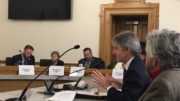By Jeffrey A. Roberts
CFOIC Executive Director
A Denver attorney’s comments to the press about a federal class-action lawsuit were protected by the litigation privilege, which immunizes a lawyer who makes allegedly defamatory statements related to a civil court case, the Colorado Supreme Court decided Monday, reversing a 2021 ruling by the Court of Appeals.
The appellate court “erred” in carving out an exception to the privilege for statements made in class-action suits where the class is “ascertainable” or easy to identify through discovery, the justices determined, calling such an exception “unworkable in practice.”

“Because the allegedly defamatory statements at issue had some relation to and were made in furtherance of the objective of the class action litigation, we conclude that these statements were privileged,” the Supreme Court also concluded.
The ruling concerns a case brought against Killmer, Lane & Newman, a prominent Denver civil rights law firm. In December 2021, the Court of Appeals decided the firm could be held liable for certain comments attorney Mari Newman made at a news conference about a federal class-action lawsuit filed on behalf of technicians working for a nail salon. The salon sued Newman for defamation after she alleged the workers had been forced to clean the business “for no pay whatsoever.”
Last March, the Colorado Freedom of Information Coalition submitted a friend-of-the-court brief in the case, arguing that the Court of Appeals opinion, if allowed to stand, would chill “legitimate speech that allows the media to keep the public informed on matters of significant public concern.” The brief was co-signed by the Colorado Press Association, the Colorado Broadcasters Association, the Gannett newspaper company and the American Civil Liberties Union of Colorado.
“The First Amendment protects not only the interests of speakers, such as the lawyers here, but also the media’s and the public’s interests in receiving newsworthy information about matters of public concern,” wrote Boulder attorney Matthew Simonsen in the organizations’ brief.
The Supreme Court rejected the nail salon’s “assertion that the litigation privilege excludes all statements made by lawyers in press conferences or press releases.” The salon’s lawyers, Justice Richard Gabriel wrote for the court, relied heavily on a 1984 Arizona Supreme Court ruling that determined an attorney’s statements were not privileged “because the ‘recipient’ of the allegedly defamatory statements was a newspaper reporter who ‘had no relation to the proposed class action.’ We respectfully disagree with our sister court’s determination that the ‘recipient’ of the attorney press statements in that case was the newspaper reporter, rather than the public …”
“Today, the Colorado Supreme Court recognized that publicity is essential to the work of effective public interest lawyers who are educating the community about their legal rights, and that lawyers — and our clients — should not fear being sued in retaliation for speaking truthfully about their cases,” Newman said in statement released by her law firm. “I am hopeful that this Colorado Supreme Court decision will prevent future meritless lawsuits from corporations that seek to punish lawyers and parties who courageously stand up for their legal rights.”
The justices found that five statements deemed defamatory by the nail salon “merely repeated, summarized, or paraphrased allegations made in the class action complaint.” They declined, however, to establish “a broad, bright-line rule that would always allow defamatory statements in the context of announcing a class action.”
“Attorneys do … remain accountable to the tribunals in which they appear for improper statements that they make, and attorneys may face sanctions or disciplinary action for violations of applicable court rules and rules of professional conduct in connection with their public statements,” Gabriel wrote, citing the recent Colorado discipline of former Donald Trump attorney Jenna Ellis for making false claims about the 2020 presidential election.
Follow the Colorado Freedom of Information Coalition on Twitter @CoFOIC. Like CFOIC’s Facebook page. Do you appreciate the information and resources provided by CFOIC? Please consider making a tax-deductible donation.




